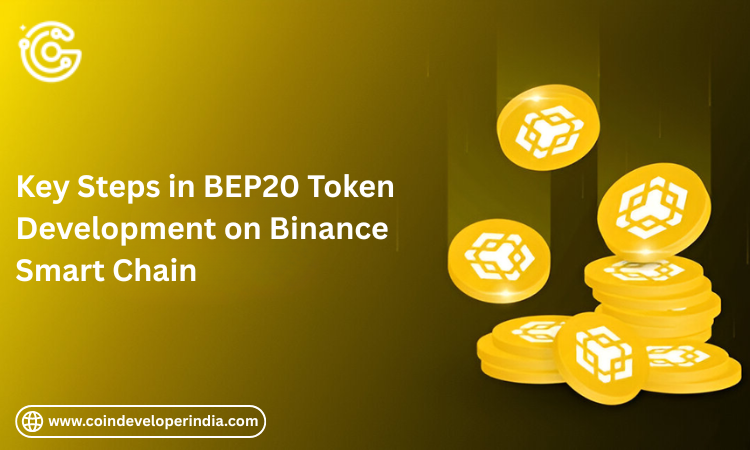Key Steps in BEP20 Token Development on Binance Smart Chain

The world of cryptocurrency is abuzz right now, and creating your own token is easier than ever! If you’re considering launching a digital token, the BEP20 token standard on Binance Smart Chain (BSC) is definitely one of the best options. With its impressive speed, low transaction fees, and growing popularity, BSC has quickly become a go-to platform for developers and startups.
In this blog, we’ll walk you through the essential steps to developing a BEP20 token—whether you’re just starting out or exploring blockchain for your business.
What is a BEP20 token?
BEP20 is a technical standard used on Binance Smart Chain, just like Ethereum’s ERC-20. It describes how a token works on the network—how it can be transferred, how balances are managed, and how access is controlled.
BEP20 tokens can represent a wide range of digital assets, from utility tokens to stablecoins and beyond. These tokens work seamlessly with BSC wallets like MetaMask, Trust Wallet, and Binance Chain Wallet.
Key steps to develop a BEP20 token
Define your token requirements
Before you begin development, take some time to clearly outline the purpose and features of your token:
- Token name (e.g., MyToken)
- Symbol (e.g., MYT)
- Total supply (e.g., 1,000,000)
- Decimals (typically 18 for Ethereum and BSC)
- Ownership rights (burnable, mintable, posable, etc.)
Having a good grasp on these aspects will help you create a token that suits both your technical needs and business objectives.
Set up your development environment
To start your building journey on BSC, you will need a few things:
- MetaMask browser extension for wallet setup
- Remix IDE – a useful browser-based tool for writing, compiling, and deploying smart contracts
- Solidity – a programming language for crafting BEP20 smart contracts
- BNB tokens to cover gas fees during deployment
Don’t forget to connect MetaMask to the Binance Smart Chain testnet before you begin!
Write a BEP20 smart contract
Now we come to the technical aspect—how to create your smart contract using Solidity. You can start with a basic BEP20 template or use open-source libraries like OpenZeppelin, which provide ready-made and secure token contracts.
A typical BEP20 smart contract has these attributes:
- totalSupply – this sets the total number of tokens available
- balanceOf – this indicates how many tokens each user has
- transfer – this allows users to send tokens
- approve and transferFrom – these enable delegated transfers
- mint and burn (optional) – these let you create or destroy tokens
Make sure to follow best coding practices and comment your code well for better clarity.
Test your token on the BSC testnet
Before going live on the mainnet, it is important to thoroughly test your smart contract. Use the Binance Smart Chain testnet to detect any bugs, security issues, or functional interruptions.
You can obtain test BNB tokens from BSC faucets and run simulations to ensure:
- Transfers are working correctly
- Balances are updating as expected
- Minting and burning features are working properly
Deploy to the Binance Smart Chain mainnet
After completing testing, it’s time to launch your token on the BSC mainnet. Switch your MetaMask to the mainnet, load some BNB into it for gas fees, and deploy the contract using Remix.
After deployment, you will receive a contract address. You can verify and publish the contract on BscScan, making it easier for users to view and interact with it.
Promote and distribute your token
Now that your token is officially live:
- Share your token contract address with your audience
- List it on decentralized exchanges like Pancakeswap
- Provide liquidity for smooth trading
- Think about airdrops or rewards to encourage token adoption
Also, don’t forget to update your website, whitepaper, and social media channels to keep your community informed.
Final Thoughts
Getting into BEP20 token development is an exciting way to step into the world of cryptocurrencies—whether you’re building a DeFi application, starting a new venture, or launching a new digital currency. With the right approach, tools, and a keen eye for the nuances, you can successfully launch a secure BEP20 token on the Binance Smart Chain.
If you’re not very tech savvy, it might be a good idea to hire a professional BEP20 token development company to help you complete the process smoothly and securely.
Technoloader stands out as a great BEP20 token development company that offers comprehensive blockchain solutions. From creating smart contracts to deploying tokens and listing them on exchanges, Technoloader offers secure, scalable, and budget-friendly services to help you turn your crypto project into reality.




